Winston Churchill Is Still Our Template for Wartime Heroism
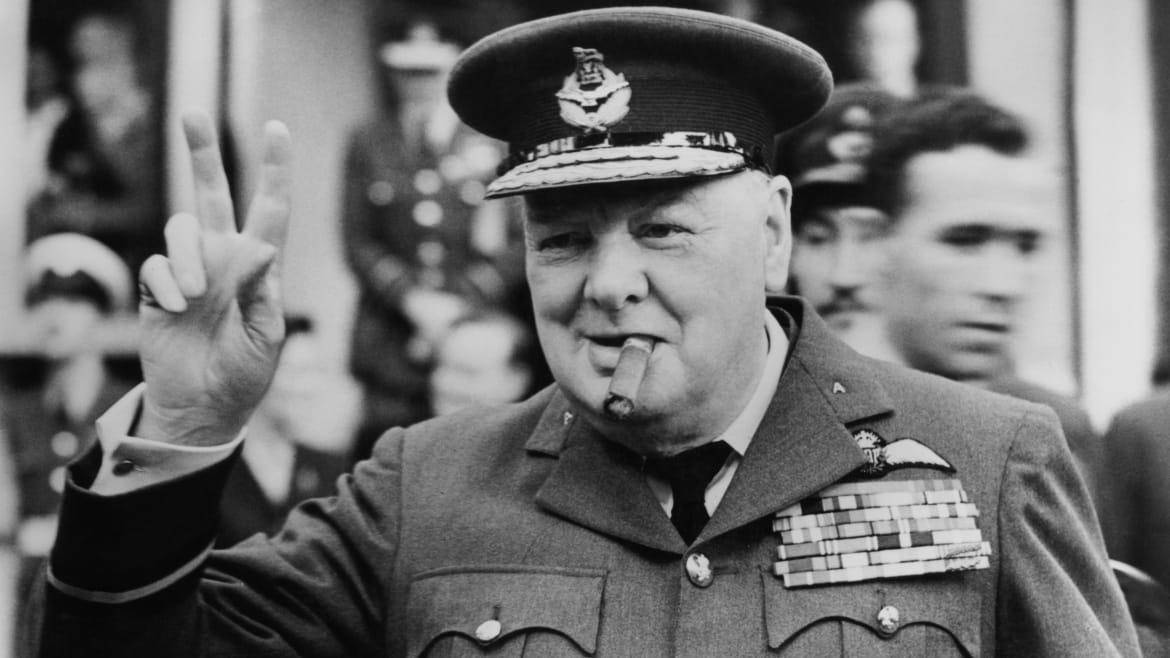
- Oops!Something went wrong.Please try again later.
- Oops!Something went wrong.Please try again later.
It’s hard to imagine two men of more radically different backgrounds than Winston Churchill and Volodymyr Zelensky. Yet, while we watch Ukraine’s villages and cities turned into charred rubble, it’s hard to regard the nerve, courage, and inspiring wit of their president without recalling the last man who, in the face of a firestorm of naked aggression, inspired his country and united the world.
Regardless of one’s opinion of the man, from World War II to God knows when, a democratic leader who makes a Homeric stand against authoritarianism will be likened to Churchill.
In 2002, 37 after his death and after his life and career were subject to more than six decades of myth-mongering, scrutiny, and revisionism, a BBC poll declared Winston Churchill “the greatest Briton.” That means greatest ever. Left in the dust were such great Brits as Elizabeth I, Shakespeare, Dickens, and King Arthur. We don’t know, of course, if the last one ever existed, but real or no, he is as real as many of the incarnations of Winston Churchill that have appeared on stage, screen, and the internet.
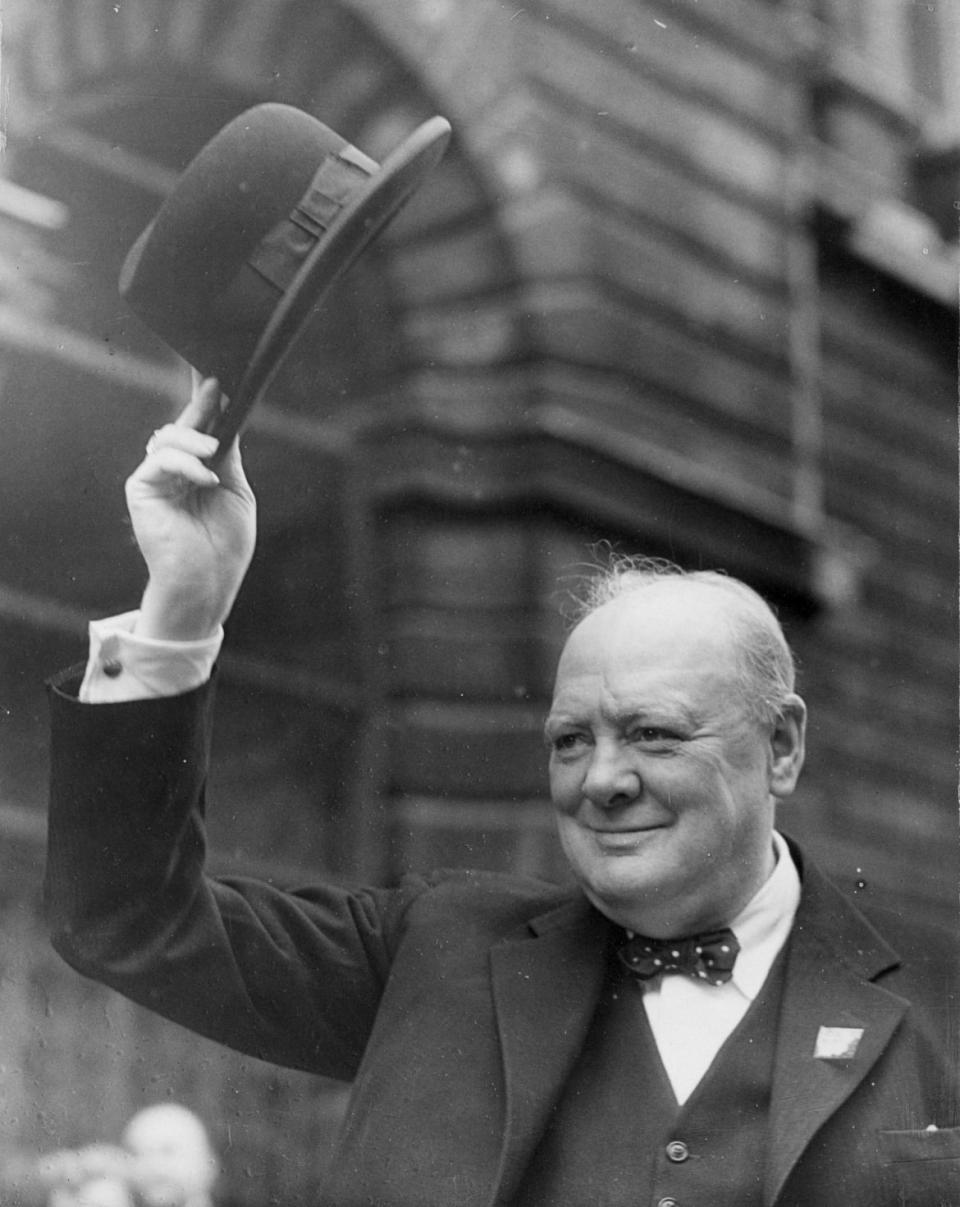
Winston Churchill waving his hat to the crowds at Downing Street.
According to British professors Steven Fielding, Bill Schwarz, and Richard Toye in The Churchill Myths, he is “a highly charged figure through whom many Britons imagine their relationship with their past, present and future.” (p. 1) There’s much to fuel their imaginations.
In This Time of Coronavirus ‘War,’ I Really Miss Winston Churchill
He has been portrayed by Americans such as John Lithgow, whose solid presence lends much-needed gravitas to the soap opera-ish frippery of The Crown, a Welshman (Richard Burton, 1974, The Gathering Storm), an Irishman (Brendan Gleason in the 2009 remake of Into The Storm), a Scotsman (Brian Cox, 2017, Churchill), an Australian (Rod Taylor in Quentin Tarantino’s Inglourious Basterds, 2009), and even an occasional Englishman (Albert Finney, The Gathering Storm, 2002), Timothy Spall, (The King’s Speech, 2010) and of course, Gary Oldman, who won an Oscar for The Darkest Hour in 2018.
Churchill is never seen in Christopher Nolan’s magnificent 2017 Dunkirk, but his essence pervades the film, elevating what Churchill called a disastrous defeat to Homeric heights. Played by a heavily made-up Kit Harrington on SNL, he is a comic punchline consoling a distraught Teresa May, and Louis Anderson brought him to life in a Season 4 episode of Drunk History. Played by Ian Macneice, he is of fantasy, the only recurring historical character on Dr. Who.
And played by several actors, the man who would save civilization from Hitler and his gangsters appears as the shadowy Machiavellian power in the Home Office who uses the street gangs of the industrial towns to fight fascists in Peaky Blinders. (“If there are bodies to be buried,” Churchill tells gang boss Tommy Shelby, played by Killian Murphy, “dig holes and dig them deep.”)
Churchill’s place in history is well established, but Churchill lit thrives with a new book every year on some aspect of his life. This month marks the paperback edition of one of the best, Eric Larson’s The Splendid and the Vile: A Saga of Churchill, Family and Defiance During the Blitz.
Do we really need more books about Churchill? Was he right, as he told a perspective biographer in 1950, that, “There’s nothing much in that field left unplowed”? Asked another way, does Churchill’s career before and after World War II merit the nearly 700 biographies and perhaps ten times as many histories that feature him?
In addition, Churchill wrote a catalog of histories, biographies, and memoirs—his history of World War II alone is nearly twice as long as Gibbon’s The Decline and Fall of the Roman Empire. Many of his books, particularly his four-volume A History of the English-Speaking Peoples, are still fresh and readable after more than 60 years, but, let’s face it, much of his oeuvre has descended into the twilight realm of the praised but unread. Does anyone but a biographer need to read the four-volume Marlborough, His Life and Times? Or even his two-volume account of his father’s life, Lord Randolph Churchill?
Brought together with the estimated 15 tons of papers and 8-10 million words of his speeches, the sheer tonnage of Churchill lit might be heavy enough to send the submarine H.M.S. Churchill to the bottom.
The collected Churchill is larger than that the papers of the ten PMs who preceded him combined. Why? The answer is so obvious that it’s seldom acknowledged: World War II. If Britain had fallen to Hitler, the Allies would likely have lost the war, and if not for Churchill, Britain would have fallen. This is, of course, an oversimplification, but the point survives it. It’s true that much of the writing by and about Churchill concerns the 65 years before World War II began, but none of that would matter to us if not for Churchill and the War.
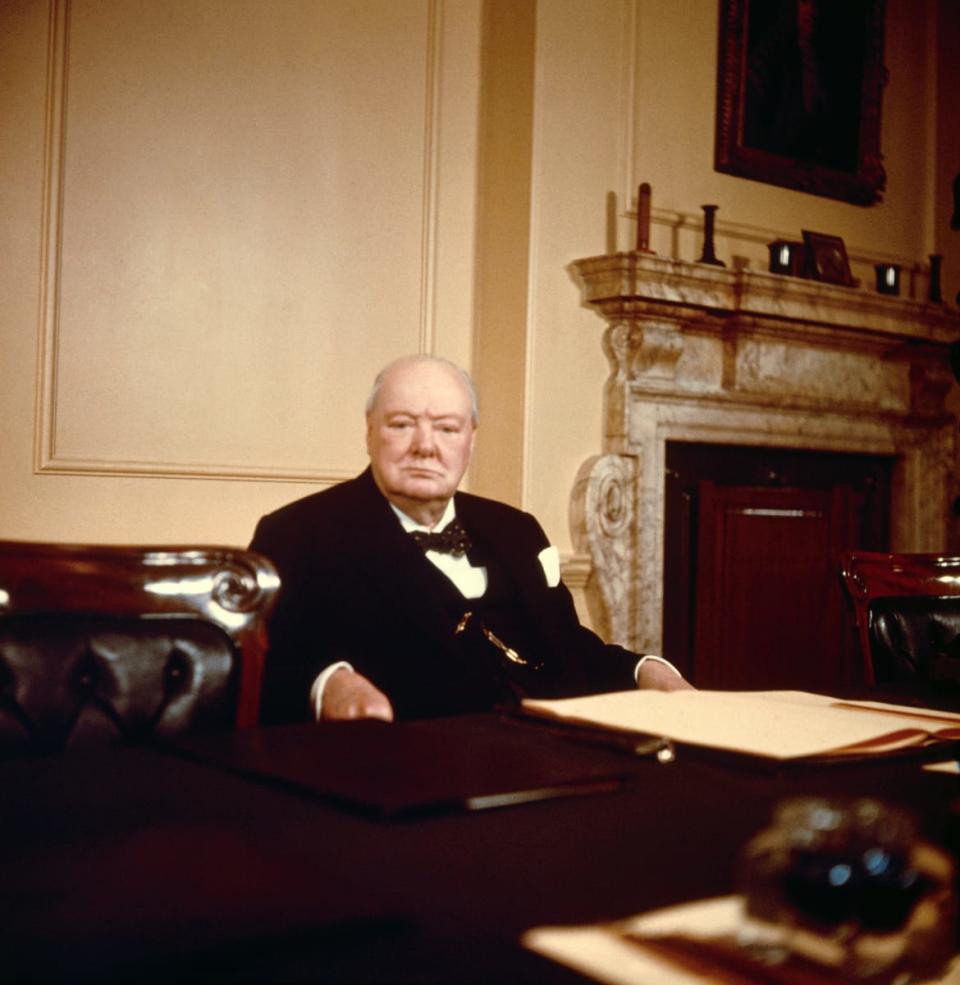
Sir Winston Churchill, Britain's Prime Minister, seated at his desk on his 80th birthday.
Which is why The Splendid and the Vile is the one book about Churchill that can be enjoyed both by those who worship and despise the man. (The title is taken from the memoir of Churchill’s secretary John Colville, who, watching a night air raid on London from his home, wrote “Never was there such a contrast of natural splendor and human vileness.”
If Churchill is about the War, then the essence of that War is during his first year as prime minster, 1940 to late 1941 when, to Churchill and Britain’s immense relief after exhausting and costly efforts to fight off the threat of a German invasion, the United States finally declared war on Germany. This was the time when, in Larson’s words, “Churchill, the cigar-smoking bulldog we all think we know, when he made his greatest speeches and showed the world what courage and leadership looked like.”
As the authors of The Churchill Myths phrase it, “From early on Churchill possessed an unwavering disposition to locate his life in a greater history—as the embodiment of his long line of ancestors, from the Duke of Marlborough to his father Randolph—and to project his own persona onto the larger screen.” Or as Churchill himself put it, his life was an “endless moving picture in which one [himself] was an actor.”
Despite the black clouds gathering over Europe, Churchill was, on assuming office, “elated. He had lived his entire life for this moment. That he had come at such a dark time did not matter. If anything, it made his appointment all the more exquisite.”
In the kind of anecdotal brushstroke that makes The Splendid and the Vile such a compelling page turner, Larson adds, “In the fading light, Inspector Thompson [Churchill’s bodyguard] saw tears begin to slip down Churchill’s cheek. Thompson, too, found himself near tears.”
His ascension came not a moment too soon—“All England possessed,” writes Larson, “was courage.” Churchill clearly understood from the outset two things that, apparently, many political and military figures in Britain and the U.S. did not. First, “The whole fury and the might of the enemy must very soon be turned on us. Hitler knows that he will have to break us in this island or lose the war.” And, second, that Britain could not win it without the participation of the United States. “Left to itself, he believed, Britain could endure and hold Germany at bay, but only the industrial might and manpower of America could ensure the final eradication of Hitler …”
One thing that Churchill did not clearly understand was how American politics worked—an odd lapse of judgment for someone whose mother was American. He knew that American public opinion was influenced by isolationists, “But it also galled Churchill that Roosevelt was unable to see forward”—that the longer America waited, the more costly interventions would be. “Churchill knew that Roosevelt was an ally in spirit, but like many of his fellow countrymen, Churchill imagine the president to have more power than he did.” His son Randolph confessed to his father that he did not see how Britain could win the war, to which Winston replied, “I shall drag the United States in.”
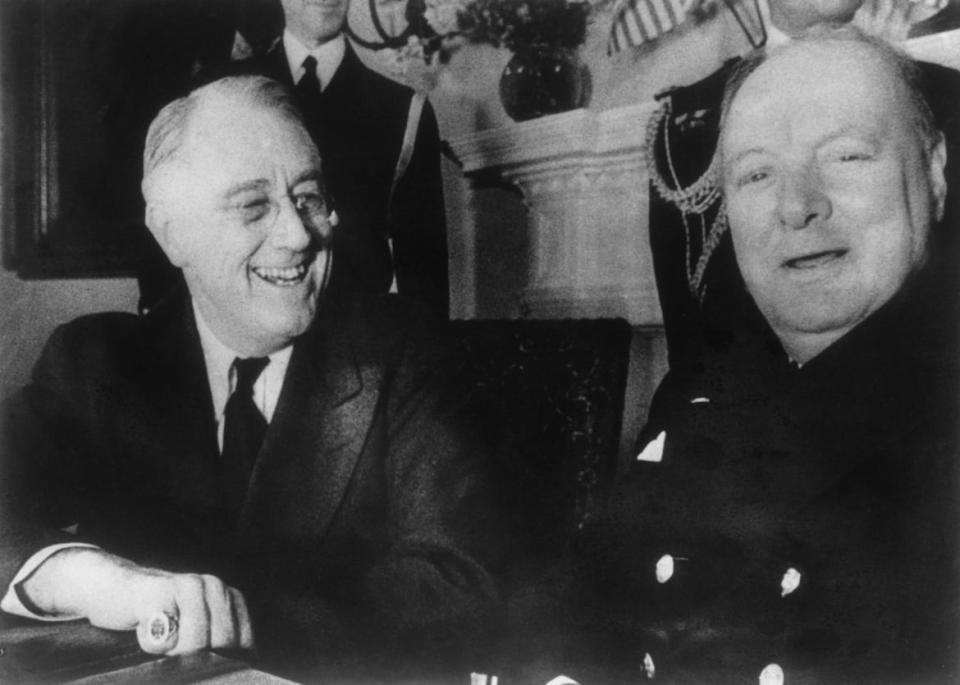
President Franklin D. Roosevelt with British Prime Minister Winston Churchill at the White House, Washington DC, December 1941.
The famous speech after the miracle of Dunkirk (“We shall fight on the beaches …”) was received only halfheartedly by some Brits, “But the audience Churchill mainly had in mind when he crafted his speech was, once again, America, and there it was viewed as an unequivocal success, as might be expected, since the hills and beaches to be fought upon were four thousand miles away.”
The next day the Luftwaffe began bombing the British mainland, destroying manufacturing, airfields, and neighborhoods all across England; the cost was enormous: as many as 43,000 lives lost and 139,000 injured, and two million homes damaged or destroyed, over half of them in London.
Simply put, Churchill wanted “American aid. Masses of it: ships, planes, bullets, machine parts, food. He simply didn’t want to have to pay for it, and, indeed, was fast running out of the means to do so.” His unflagging tenacity sustained Britain for more than a year and a half until U.S. help finally came. Remarkably, as even a Churchill critic like George Orwell noted, he never lied to the British people about the difficulties they faced, offering them nothing, we all know, but “blood, toil, tears, and sweat.” He tempered the public elation over the saving of the British army from Dunkirk by reminding them, “Wars are not won by evacuation”—making a mockery of leaders who respond to a crisis by denying it or lying that “We’re turning the corner.”
Privately he was close to despair. When a group of people waited at the entrance to No. 10 Downing Street to offer their support, he said to an aide, “Poor people. They trust me, and I can give them nothing but disaster for quite a long time.” After his famous “We shall never surrender” speech, with the House roaring its approval, he muttered to a colleague, “and… we will fight them with the butt end of broken bottles, because that’s bloody well all we’ve got.”
Alliance with the United States came about not through Churchill’s persistence but as a result of Japanese aggression and Hitler’s foolish actions in supporting Japan by declaring war on the U.S. after Pearl Harbor.
Larson squeezes the announcement of the bombing of Pearl Harbor for the last dash of drama. On the Sunday evening of Dec. 7, 1941, the prime minister and several guests, including FDR’s emissary to Britain Averill Harriman, and some family members finished dinner and sat back in their chairs to listen to the BBC evening broadcast. They heard the announcer say, “The Japanese have raided Pearl Harbor.” U.S Ambassador John Winant, also present, glanced toward Churchill. “We looked at one another incredulously,” Winant wrote.” Churchill leapt from his chair, slammed the top of the radio, and told everyone, “We shall declare war on Japan.”
Winant would later recall, “There is nothing half-hearted or unpositive about Winston Churchill—certainly not when he is on the move.” Moments later, FDR confirmed to the PM the news of the attack. “We are all,” FDR told WC, “in the same boat now.”
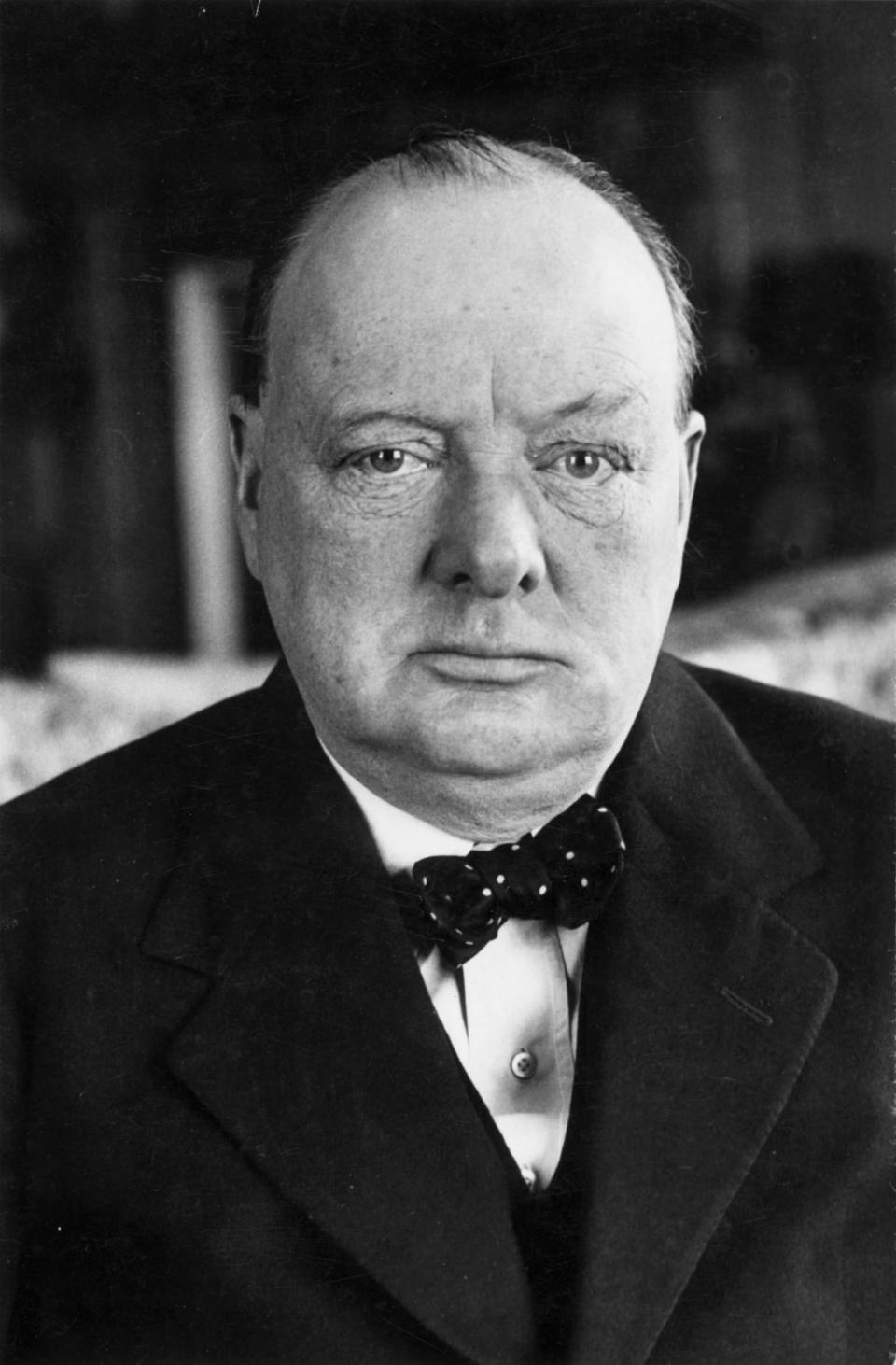
British politician and Prime minister Winston Leonard Spencer Churchill.
As in his best sellers—his book on the Lusitania, Dead Wake, and The Devil in the White City, about a serial killer at the 1893 Chicago World’s Fair (film rights optioned by Leonardo DiCaprio)—Larson weaves a historical narrative illuminated by vivid detail and eyewitness accounts. This is his biggest canvas, and his style of dividing events into two-six page vignettes is brilliant as you never lose track of who is who, what’s happening, and why it is important.
Churchill, an animal-lover, found much solace in his pets: “Love me, love my dog,” he told his secretary, “and if you don’t love my dog, you damn well can’t love me.” His black cat, Nelson (for Lord Nelson, of course) had the run of the prime ministerial estate Chequers. Churchill was fond of working in bed with Nelson, “the portrait of peace and repose,” sprawled at his feet… Churchill gazed adoringly at the cat and murmured, “Cat, darling.” When evacuating during an air raid, the PM realized Nelson had been left behind and demanded the driver turn around to retrieve him. And they did.
Most shocking of all was “Churchill’s peculiar taste in underclothes: pale pink and made of silk.” (One can only wonder what color Hitler preferred.)
Larson even finds something kind of good to say about Hitler, who forbade Goering from smoking while being photographed, “fearing the influence such publicity might have on the morals of German youths.”
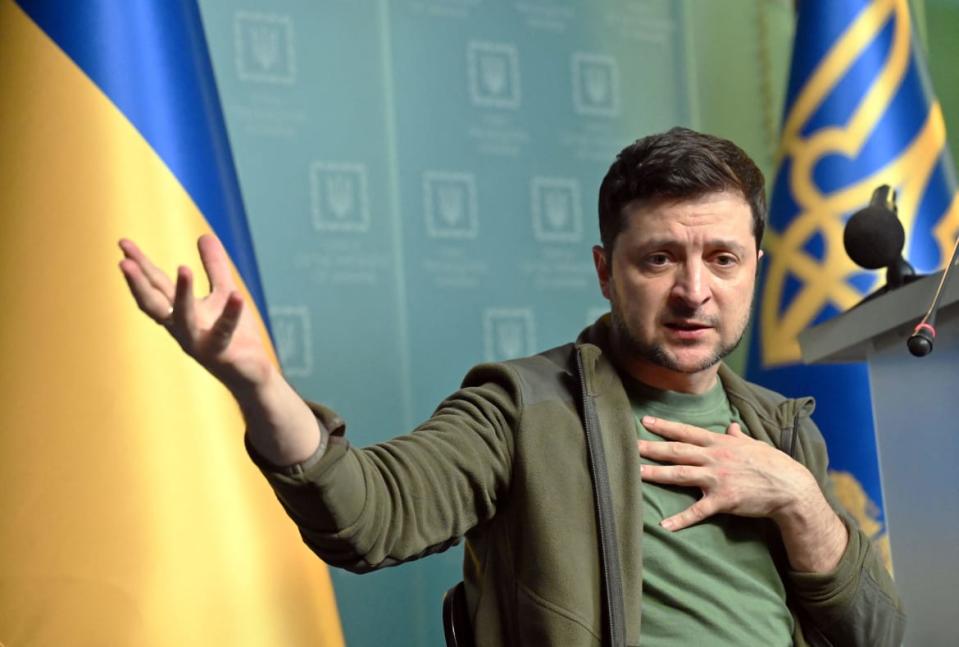
Ukrainian President Volodymyr Zelensky gestures as he speaks during a press conference in Kyiv on March 3, 2022.
The Splendid and the Vile is the book you want to remember Churchill by and, quite likely, the book he would choose to be remembered by. It is also, I suspect, the book he would want to be remembered for. As the first year of Churchill’s tenure as prime minister came to an end, “Against all odds, Britain stood firm, its citizens more emboldened than cowed. Somehow, through it all, Churchill had managed to teach them the art of being fearless.” When told by the wife of one of his ministers that the best thing he had done was to give the British people courage, he disagreed. “‘I never gave them courage,’ he said. ‘I was able to focus theirs.’” Which should serve not only as an epithet, but as an explanation for why he remains an inspiration for men like Zelensky. Likewise, it’s hard to believe that if Churchill heard Zelensky tell the U.S. president, “I need more ammunition, not a ride,” he wouldn’t have been a bit envious.

Get the Daily Beast's biggest scoops and scandals delivered right to your inbox. Sign up now.
Stay informed and gain unlimited access to the Daily Beast's unmatched reporting. Subscribe now.

